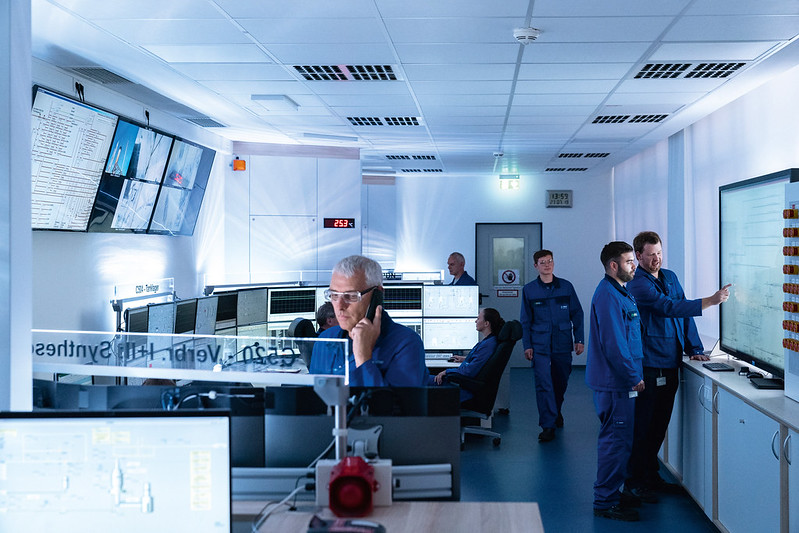When some of the biggest companies that make up the First State’s $5 billion manufacturing industry need support behind the scenes to keep their wheels turning, they call in some local help.
See, factories producing widgets on assembly lines are just one part of Delaware’s manufacturing sector. It also includes companies that provide services to those physical manufacturers, such as research and development or engineering.
Applied Control Engineering (ACE), a Newark-based company that specializes in process control and systems integration, is one that provides engineering services. Founded in 1991 by three former DuPont chemical engineers, the 2021 CFE Media System Integrator of the Year company has seen slow and steady growth. It acquired TransAmerican Automation, Inc. in 2005 and nowadays has offices in Delaware, Connecticut, Maryland, Massachusetts, Pennsylvania and Texas.
When Ian Burns, president and one of six principle owners of ACE, started with the company right out of college 26 years ago, it had just 10 employees. Today, it has over 130 employees, with 75 of them in Delaware. Of those, 50 work in engineering. Some are active in the community, supporting future STEM careers by volunteering at schools, judging science fairs and project-based competitions, and coaching FIRST Robotics teams.
“We provide engineers who work in automation,” he said, “and the tools that make them competitive.”
Much of the engineering ACE provides supports the computer systems in manufacturing plants’ command centers, where everything is monitored, from temperature to production speed. These systems keep the plants and their employees safe by showing any real-time potential problems, letting employees know when maintenance is needed, and creating detailed datasets that executives can parse. Here in Delaware, it’s usually a chemical, pharmaceutical, or oil and gas plant where this work is applied.
ACE has clients of all sizes. Being near huge manufacturers like DuPont and FMC has its benefits.
“Having access to the headquarters, the scientists and the R&D facilities that go along with [that proximity] has certainly helped us,” Burns said. But the big players are only a part of the industry in Delaware: “It’s also mom-and-pop-type shops where you go down 896 to Corporate Boulevard, we have a lot of customers in that office park in warehouses that you wouldn’t think there was a major manufacturer, but they’re manufacturing. The small ones need us just as much as the big ones because they don’t have an engineering staff on hand.”
It makes sense that small manufacturing companies open in Delaware, he said.
“We’ve got a great talent pool of both young individuals and a good workforce able to support a manufacturing environment,” Burns said. “There are lots of other manufacturers in the area, so the infrastructure to support manufacturing is here.”

Ian Burns. (Photo via LinkedIn)
Despite the skilled labor shortage that has impacted the larger industry in the state, ACE has been able to find engineers, both out of the University of Delaware and from the small pool of engineers ready move on from jobs at the bigger companies.
“Having them in the region has certainly helped us grow, because we have resources we can reach out to and hire,” Burns said.
The company has hired several engineers in Delaware already this year, and it plans to continue hiring as it continues to grow.
One of ACE’s growth areas is cybersecurity.
“Every automation system out there is a computer and is more or less connected to the internet somehow,” Burns said. “By helping on the cybersecurity side, we’re helping to prevent incidents like the attack on a water treatment plant in Oldsmar, Florida, in February.”
In that case, an attacker remotely accessed the facility’s computer system and increased the amount of sodium hydroxide, or lye, added to the water by more than 100 times before a remote supervisor intervened. No one was harmed, but it’s a reminder that cybersecurity is essential now that virtually everything is online.
“When Ian and I stared in this business, you didn’t connect these systems to anything, you had a controller, maybe a computer interface,” said Dave Erby, ACE operations manager and another principle owner of the company. “Now you have whole networks. There’s the need for data, but the other edge of the sword is that you’ve got to protect it.”
In essence, automation, which has been linked to job loss since the beginning, is also a big a job creator.
“Some of the most automation-proof jobs are in the trades in automation,” Erby said. “Automation companies are constantly expanding with their processes. Supporting manufacturing is very much a team effort, so you’ve got your mechanical contractors, your electrical contractors — those are things that are not going to go away. You can’t automate that in the future. For stable jobs that pay good wages, those are some of the best jobs to get into, I think, especially since those types of jobs don’t really require a four-year degree.”
Degree-holding engineers are also in high demand.
“We’re constantly looking for control systems engineers, engineers from electrical to mechanical to chemical that can support the automation side,” Erby said. “Manufacturing seems to be set to expand, overall, and I think Delaware is going to see that as well.”

This article appears in a series on manufacturing in Delaware and is underwritten by Delaware Prosperity Partnership. It was independently reported and not reviewed by this partner before publication.
Before you go...
Please consider supporting Technical.ly to keep our independent journalism strong. Unlike most business-focused media outlets, we don’t have a paywall. Instead, we count on your personal and organizational support.
Join our growing Slack community
Join 5,000 tech professionals and entrepreneurs in our community Slack today!

The person charged in the UnitedHealthcare CEO shooting had a ton of tech connections

Delaware students take a field trip to China using their tablets and ChatGPT

From rejection to innovation: How I built a tool to beat AI hiring algorithms at their own game


